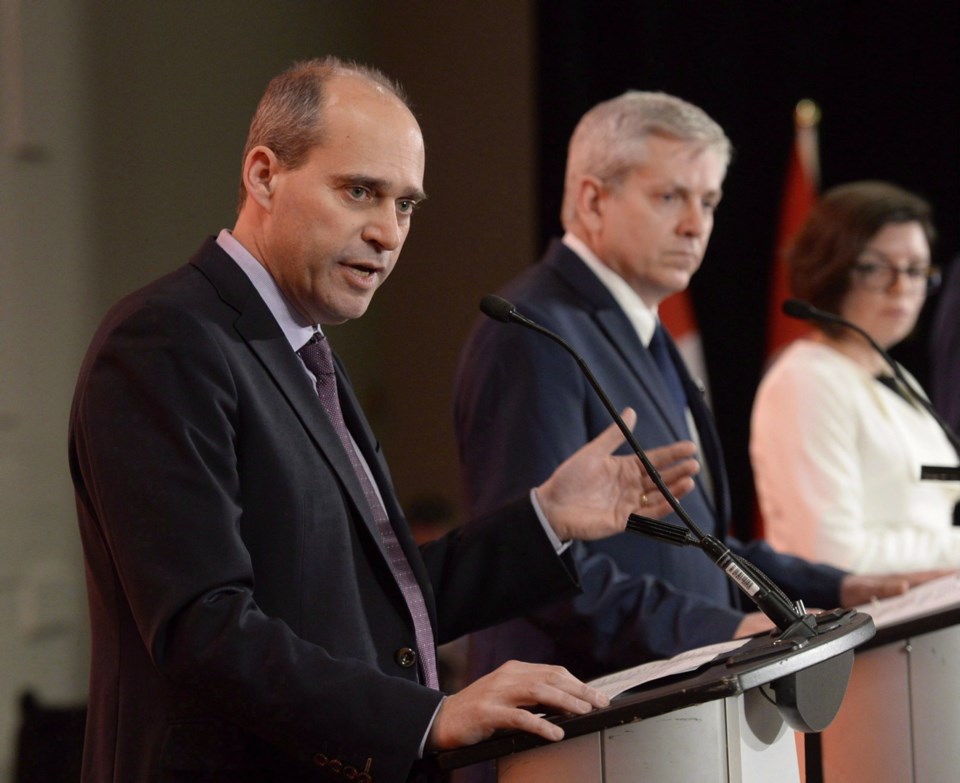Three of four federal NDP leadership candidates were in Victoria Wednesday night to outline why they’re the best person to lead the party.
Jagmeet Singh, Niki Ashton and Guy Caron largely agreed on treating the opioid crisis as a public health issue rather than a law and order issue, investing in co-operative housing projects, reforming assisted-dying legislation and ending criminal prosecutions for marijuana possession.
Northern Ontario MP Charlie Angus, who is also in the leadership race, could not make the debate because he needed to stay with his sister, who is in palliative care. He delivered a brief video message before the debate, which drew a crowd of at least 300 people to the Victoria Conference Centre.
In a city where the vacancy rate is 0.5 per cent, the first question of the night was about affordable housing.
Singh, an Ontario MPP and deputy leader of the NDP in that province, said there needs to be a national housing strategy as well as support for co-operative housing.
Caron, a Quebec MP and former NDP finance critic, said the Canadian Mortgage and Housing Corporation should return to its original mandate of providing stable social housing.
Ashton promised to dedicate $10 billion a year to build 40,000 new social housing units. The Manitoba MP said the government needs to stop speculative investors from “exploiting housing insecurity across this country.”
Singh and Ashton want to see the opioid epidemic declared a national health crisis. Both favoured a harm-reduction approach with more supervised-injection sites and an easier approval process for the sites.
“This is literally devastating communities across the country,” Singh said.
Caron supports better measures at the border to stop the smuggling of illicit drugs into Canada, but also a more compassionate approach to those dealing with addiction.
All three candidates agreed there need to be major reforms to the assisted dying legislation to ensure people are able to access that right. Right-to-die advocates have criticized the requirement that a death be “reasonably foreseeable” for people to access medically assisted dying.
On health care and care for seniors, Singh pressed for a guaranteed basic income to prevent seniors from living in poverty. Ashton wants to see a reversal to cuts to health-care funding made by the previous Conservative government, which she said Prime Minister Justin Trudeau has kept in place. She also endorsed universal pharmacare and dental care, which drew support from Singh.
Caron said provinces need to better communicate with each other to share best practices in health-care delivery so they are not working in silos.
All candidates said they were opposed to Kinder Morgan’s $7.4-billion Trans Mountain pipeline plan, which was given the green light in November.
Singh said the approval of the pipeline was a “betrayal of the people of B.C.” and criticized the federal government for not getting consent from all Indigenous groups affected by the project.
The tone of the debate was polite and civil, with very few personal jabs or raised voices.
At one point, Caron summed up why the race to replace Tom Mulcair isn’t necessarily captivating Canadians: “Sometimes it’s so boring because we all agree.”
The debate comes as the candidates work to sign up as many party members as possible before a registration cutoff on Aug. 17.
“I think this debate, while in the middle of summer, is actually a critical point in this leadership race,” said NDP strategist Robin MacLachlan, vice-president of the public affairs firm Summa Strategies, adding: “Victoria is a hotbed of progressive politics in this country.”
Singh’s campaign appears to be resonating with politicians in B.C., where he has earned the support of eight provincial legislators and four B.C. MPs, including Alistair MacGregor, the caucus justice critic who represents Cowichan-Malahat-Langford, and Esquimalt-Saanich-Sooke MP Randall Garrison.
A new leader will be chosen in October through a ranked ballot vote.
— With files from The Canadian Press



